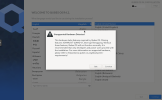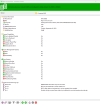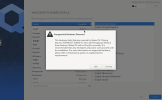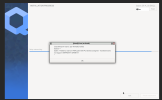Hello everyone,
I lost a lot of time installing the Qubes system in vProxmox.
I want to ask for your help in this post.
My Hardware as the following
Motherboard
ASUS TUF GAMING B650-PLUS WIFI
CPU
AMD Ryzen 9 7900 12-Core, 24-Thread Desktop Processor with AMD Wraith Prism Cooler, up to 5.4GHz
I had enabled every think in the Bios
IOMMU enabled
The output of the command
kvm-ok
is the following
and the command lscpu
root@pve:~# lscpu
Architecture: x86_64
CPU op-mode(s): 32-bit, 64-bit
Address sizes: 45 bits physical, 48 bits virtual
Byte Order: Little Endian
CPU(s): 8
On-line CPU(s) list: 0-7
Vendor ID: AuthenticAMD
BIOS Vendor ID: AuthenticAMD
Model name: AMD Ryzen 9 7900 12-Core Processor
BIOS Model name: AMD Ryzen 9 7900 12-Core Processor CPU @ 3.5GHz
BIOS CPU family: 2
CPU family: 25
Model: 97
Thread(s) per core: 1
Core(s) per socket: 2
Socket(s): 4
Stepping: 2
BogoMIPS: 7386.13
Flags: fpu vme de pse tsc msr pae mce cx8 apic sep mtrr pge mca cmov pat pse36 clflush mmx fxsr sse sse2 ht syscall nx mmxext fxsr_opt pdpe1
gb rdtscp lm constant_tsc rep_good nopl tsc_reliable nonstop_tsc cpuid extd_apicid tsc_known_freq pni pclmulqdq monitor ssse3 fma cx1
6 sse4_1 sse4_2 x2apic movbe popcnt aes xsave avx f16c rdrand hypervisor lahf_lm cmp_legacy svm extapic cr8_legacy abm sse4a misalign
sse 3dnowprefetch osvw topoext ssbd ibrs ibpb ibrs_enhanced vmmcall fsgsbase bmi1 avx2 smep bmi2 erms invpcid avx512f avx512dq rdseed
adx smap avx512ifma clflushopt clwb avx512cd sha_ni avx512bw avx512vl xsaveopt xsavec xgetbv1 xsaves avx512_bf16 clzero wbnoinvd ara
t npt svm_lock nrip_save vmcb_clean flushbyasid decodeassists avx512vbmi umip pku ospke avx512_vbmi2 gfni vaes vpclmulqdq avx512_vnni
avx512_bitalg avx512_vpopcntdq rdpid overflow_recov succor fsrm flush_l1d
Virtualization features:
Virtualization: AMD-V
Hypervisor vendor: VMware
Virtualization type: full
Caches (sum of all):
L1d: 256 KiB (8 instances)
L1i: 256 KiB (8 instances)
L2: 8 MiB (8 instances)
L3: 128 MiB (4 instances)
NUMA:
NUMA node(s): 1
NUMA node0 CPU(s): 0-7
Vulnerabilities:
Gather data sampling: Not affected
Itlb multihit: Not affected
L1tf: Not affected
Mds: Not affected
Meltdown: Not affected
Mmio stale data: Not affected
Retbleed: Not affected
Spec rstack overflow: Mitigation; safe RET, no microcode
Spec store bypass: Mitigation; Speculative Store Bypass disabled via prctl
Spectre v1: Mitigation; usercopy/swapgs barriers and __user pointer sanitization
Spectre v2: Mitigation; Enhanced / Automatic IBRS, IBPB conditional, STIBP disabled, RSB filling, PBRSB-eIBRS Not affected
Srbds: Not affected
Tsx async abort: Not affected
root@pve:~# ^C
root@pve:~# lscpu
Architecture: x86_64
CPU op-mode(s): 32-bit, 64-bit
Address sizes: 45 bits physical, 48 bits virtual
Byte Order: Little Endian
CPU(s): 8
On-line CPU(s) list: 0-7
Vendor ID: AuthenticAMD
BIOS Vendor ID: AuthenticAMD
Model name: AMD Ryzen 9 7900 12-Core Processor
BIOS Model name: AMD Ryzen 9 7900 12-Core Processor CPU @ 3.5GHz
BIOS CPU family: 2
CPU family: 25
Model: 97
Thread(s) per core: 1
Core(s) per socket: 2
Socket(s): 4
Stepping: 2
BogoMIPS: 7386.13
Flags: fpu vme de pse tsc msr pae mce cx8 apic sep mtrr pge mca cmov pat pse36 clflush mmx fxsr sse sse2 ht syscall nx mmxext fxsr_opt pdpe1
gb rdtscp lm constant_tsc rep_good nopl tsc_reliable nonstop_tsc cpuid extd_apicid tsc_known_freq pni pclmulqdq monitor ssse3 fma cx1
6 sse4_1 sse4_2 x2apic movbe popcnt aes xsave avx f16c rdrand hypervisor lahf_lm cmp_legacy svm extapic cr8_legacy abm sse4a misalign
sse 3dnowprefetch osvw topoext ssbd ibrs ibpb ibrs_enhanced vmmcall fsgsbase bmi1 avx2 smep bmi2 erms invpcid avx512f avx512dq rdseed
adx smap avx512ifma clflushopt clwb avx512cd sha_ni avx512bw avx512vl xsaveopt xsavec xgetbv1 xsaves avx512_bf16 clzero wbnoinvd ara
t npt svm_lock nrip_save vmcb_clean flushbyasid decodeassists avx512vbmi umip pku ospke avx512_vbmi2 gfni vaes vpclmulqdq avx512_vnni
avx512_bitalg avx512_vpopcntdq rdpid overflow_recov succor fsrm flush_l1d
Virtualization features:
Virtualization: AMD-V
Hypervisor vendor: VMware
Virtualization type: full
Caches (sum of all):
L1d: 256 KiB (8 instances)
L1i: 256 KiB (8 instances)
L2: 8 MiB (8 instances)
L3: 128 MiB (4 instances)
NUMA:
NUMA node(s): 1
NUMA node0 CPU(s): 0-7
Vulnerabilities:
Gather data sampling: Not affected
Itlb multihit: Not affected
L1tf: Not affected
Mds: Not affected
Meltdown: Not affected
Mmio stale data: Not affected
Retbleed: Not affected
Spec rstack overflow: Mitigation; safe RET, no microcode
Spec store bypass: Mitigation; Speculative Store Bypass disabled via prctl
Spectre v1: Mitigation; usercopy/swapgs barriers and __user pointer sanitization
Spectre v2: Mitigation; Enhanced / Automatic IBRS, IBPB conditional, STIBP disabled, RSB filling, PBRSB-eIBRS Not affected
Srbds: Not affected
Tsx async abort: Not affected
QEMU: Checking for hardware virtualization : PASS
QEMU: Checking if device /dev/kvm exists : PASS
QEMU: Checking if device /dev/kvm is accessible : PASS
QEMU: Checking if device /dev/vhost-net exists : PASS
QEMU: Checking if device /dev/net/tun exists : PASS
QEMU: Checking for cgroup 'cpu' controller support : PASS
QEMU: Checking for cgroup 'cpuacct' controller support : PASS
QEMU: Checking for cgroup 'cpuset' controller support : PASS
QEMU: Checking for cgroup 'memory' controller support : PASS
QEMU: Checking for cgroup 'devices' controller support : PASS
QEMU: Checking for cgroup 'blkio' controller support : PASS
QEMU: Checking for device assignment IOMMU support : WARN (No ACPI IVRS table found, IOMMU either disabled in BIOS or not supported by this hardware platform)
QEMU: Checking for secure guest support : WARN (Unknown if this platform has Secure Guest support)
LXC: Checking for Linux >= 2.6.26 : PASS
LXC: Checking for namespace ipc : PASS
LXC: Checking for namespace mnt : PASS
LXC: Checking for namespace pid : PASS
LXC: Checking for namespace uts : PASS
LXC: Checking for namespace net : PASS
LXC: Checking for namespace user : PASS
LXC: Checking for cgroup 'cpu' controller support : PASS
LXC: Checking for cgroup 'cpuacct' controller support : PASS
LXC: Checking for cgroup 'cpuset' controller support : PASS
LXC: Checking for cgroup 'memory' controller support : PASS
LXC: Checking for cgroup 'devices' controller support : PASS
LXC: Checking for cgroup 'freezer' controller support : FAIL (Enable 'freezer' in kernel Kconfig file or mount/enable cgroup controller in your system)
LXC: Checking for cgroup 'blkio' controller support : PASS
LXC: Checking if device /sys/fs/fuse/connections exists : PASS
The output of the command
cat /proc/cmdline
is
BOOT_IMAGE=/boot/vmlinuz-6.5.11-8-pve root=/dev/mapper/pve-root ro quiet amd_iommu=on iommu=pt pcie_acs_override=downstream,multifunction nofb nomodeset video=vesafb ff,efifb
ff,efifb ff
ff
The output of the command
dmesg | grep -i -e DMAR -e IOMMU
When I try to install Qubes Os I become the error message Unsupported Hardware detected (in the attachment)
When I accept this warning and after the reboot
the installation failed in in Networking setup, I got the warning popup
After that when I login into Qubes os I can’t start the Network and the usb Qubes
Hardware does not support IOMMU VT-d AMD-Vi (in the attachment)
The reason is, there are no IOMMU and no Passthrough for the PCIs.
I changed the cpu type on my vm on Vmware workstation but the same Problem
The same situation on my Proxmox server on the same computer Can you please help me.
I lost a lot of time installing the Qubes system in vProxmox.
I want to ask for your help in this post.
My Hardware as the following
Motherboard
ASUS TUF GAMING B650-PLUS WIFI
CPU
AMD Ryzen 9 7900 12-Core, 24-Thread Desktop Processor with AMD Wraith Prism Cooler, up to 5.4GHz
I had enabled every think in the Bios
IOMMU enabled
The output of the command
kvm-ok
is the following
Code:
INFO: /dev/kvm exists
KVM acceleration can be usedroot@pve:~# lscpu
Architecture: x86_64
CPU op-mode(s): 32-bit, 64-bit
Address sizes: 45 bits physical, 48 bits virtual
Byte Order: Little Endian
CPU(s): 8
On-line CPU(s) list: 0-7
Vendor ID: AuthenticAMD
BIOS Vendor ID: AuthenticAMD
Model name: AMD Ryzen 9 7900 12-Core Processor
BIOS Model name: AMD Ryzen 9 7900 12-Core Processor CPU @ 3.5GHz
BIOS CPU family: 2
CPU family: 25
Model: 97
Thread(s) per core: 1
Core(s) per socket: 2
Socket(s): 4
Stepping: 2
BogoMIPS: 7386.13
Flags: fpu vme de pse tsc msr pae mce cx8 apic sep mtrr pge mca cmov pat pse36 clflush mmx fxsr sse sse2 ht syscall nx mmxext fxsr_opt pdpe1
gb rdtscp lm constant_tsc rep_good nopl tsc_reliable nonstop_tsc cpuid extd_apicid tsc_known_freq pni pclmulqdq monitor ssse3 fma cx1
6 sse4_1 sse4_2 x2apic movbe popcnt aes xsave avx f16c rdrand hypervisor lahf_lm cmp_legacy svm extapic cr8_legacy abm sse4a misalign
sse 3dnowprefetch osvw topoext ssbd ibrs ibpb ibrs_enhanced vmmcall fsgsbase bmi1 avx2 smep bmi2 erms invpcid avx512f avx512dq rdseed
adx smap avx512ifma clflushopt clwb avx512cd sha_ni avx512bw avx512vl xsaveopt xsavec xgetbv1 xsaves avx512_bf16 clzero wbnoinvd ara
t npt svm_lock nrip_save vmcb_clean flushbyasid decodeassists avx512vbmi umip pku ospke avx512_vbmi2 gfni vaes vpclmulqdq avx512_vnni
avx512_bitalg avx512_vpopcntdq rdpid overflow_recov succor fsrm flush_l1d
Virtualization features:
Virtualization: AMD-V
Hypervisor vendor: VMware
Virtualization type: full
Caches (sum of all):
L1d: 256 KiB (8 instances)
L1i: 256 KiB (8 instances)
L2: 8 MiB (8 instances)
L3: 128 MiB (4 instances)
NUMA:
NUMA node(s): 1
NUMA node0 CPU(s): 0-7
Vulnerabilities:
Gather data sampling: Not affected
Itlb multihit: Not affected
L1tf: Not affected
Mds: Not affected
Meltdown: Not affected
Mmio stale data: Not affected
Retbleed: Not affected
Spec rstack overflow: Mitigation; safe RET, no microcode
Spec store bypass: Mitigation; Speculative Store Bypass disabled via prctl
Spectre v1: Mitigation; usercopy/swapgs barriers and __user pointer sanitization
Spectre v2: Mitigation; Enhanced / Automatic IBRS, IBPB conditional, STIBP disabled, RSB filling, PBRSB-eIBRS Not affected
Srbds: Not affected
Tsx async abort: Not affected
root@pve:~# ^C
root@pve:~# lscpu
Architecture: x86_64
CPU op-mode(s): 32-bit, 64-bit
Address sizes: 45 bits physical, 48 bits virtual
Byte Order: Little Endian
CPU(s): 8
On-line CPU(s) list: 0-7
Vendor ID: AuthenticAMD
BIOS Vendor ID: AuthenticAMD
Model name: AMD Ryzen 9 7900 12-Core Processor
BIOS Model name: AMD Ryzen 9 7900 12-Core Processor CPU @ 3.5GHz
BIOS CPU family: 2
CPU family: 25
Model: 97
Thread(s) per core: 1
Core(s) per socket: 2
Socket(s): 4
Stepping: 2
BogoMIPS: 7386.13
Flags: fpu vme de pse tsc msr pae mce cx8 apic sep mtrr pge mca cmov pat pse36 clflush mmx fxsr sse sse2 ht syscall nx mmxext fxsr_opt pdpe1
gb rdtscp lm constant_tsc rep_good nopl tsc_reliable nonstop_tsc cpuid extd_apicid tsc_known_freq pni pclmulqdq monitor ssse3 fma cx1
6 sse4_1 sse4_2 x2apic movbe popcnt aes xsave avx f16c rdrand hypervisor lahf_lm cmp_legacy svm extapic cr8_legacy abm sse4a misalign
sse 3dnowprefetch osvw topoext ssbd ibrs ibpb ibrs_enhanced vmmcall fsgsbase bmi1 avx2 smep bmi2 erms invpcid avx512f avx512dq rdseed
adx smap avx512ifma clflushopt clwb avx512cd sha_ni avx512bw avx512vl xsaveopt xsavec xgetbv1 xsaves avx512_bf16 clzero wbnoinvd ara
t npt svm_lock nrip_save vmcb_clean flushbyasid decodeassists avx512vbmi umip pku ospke avx512_vbmi2 gfni vaes vpclmulqdq avx512_vnni
avx512_bitalg avx512_vpopcntdq rdpid overflow_recov succor fsrm flush_l1d
Virtualization features:
Virtualization: AMD-V
Hypervisor vendor: VMware
Virtualization type: full
Caches (sum of all):
L1d: 256 KiB (8 instances)
L1i: 256 KiB (8 instances)
L2: 8 MiB (8 instances)
L3: 128 MiB (4 instances)
NUMA:
NUMA node(s): 1
NUMA node0 CPU(s): 0-7
Vulnerabilities:
Gather data sampling: Not affected
Itlb multihit: Not affected
L1tf: Not affected
Mds: Not affected
Meltdown: Not affected
Mmio stale data: Not affected
Retbleed: Not affected
Spec rstack overflow: Mitigation; safe RET, no microcode
Spec store bypass: Mitigation; Speculative Store Bypass disabled via prctl
Spectre v1: Mitigation; usercopy/swapgs barriers and __user pointer sanitization
Spectre v2: Mitigation; Enhanced / Automatic IBRS, IBPB conditional, STIBP disabled, RSB filling, PBRSB-eIBRS Not affected
Srbds: Not affected
Tsx async abort: Not affected
QEMU: Checking for hardware virtualization : PASS
QEMU: Checking if device /dev/kvm exists : PASS
QEMU: Checking if device /dev/kvm is accessible : PASS
QEMU: Checking if device /dev/vhost-net exists : PASS
QEMU: Checking if device /dev/net/tun exists : PASS
QEMU: Checking for cgroup 'cpu' controller support : PASS
QEMU: Checking for cgroup 'cpuacct' controller support : PASS
QEMU: Checking for cgroup 'cpuset' controller support : PASS
QEMU: Checking for cgroup 'memory' controller support : PASS
QEMU: Checking for cgroup 'devices' controller support : PASS
QEMU: Checking for cgroup 'blkio' controller support : PASS
QEMU: Checking for device assignment IOMMU support : WARN (No ACPI IVRS table found, IOMMU either disabled in BIOS or not supported by this hardware platform)
QEMU: Checking for secure guest support : WARN (Unknown if this platform has Secure Guest support)
LXC: Checking for Linux >= 2.6.26 : PASS
LXC: Checking for namespace ipc : PASS
LXC: Checking for namespace mnt : PASS
LXC: Checking for namespace pid : PASS
LXC: Checking for namespace uts : PASS
LXC: Checking for namespace net : PASS
LXC: Checking for namespace user : PASS
LXC: Checking for cgroup 'cpu' controller support : PASS
LXC: Checking for cgroup 'cpuacct' controller support : PASS
LXC: Checking for cgroup 'cpuset' controller support : PASS
LXC: Checking for cgroup 'memory' controller support : PASS
LXC: Checking for cgroup 'devices' controller support : PASS
LXC: Checking for cgroup 'freezer' controller support : FAIL (Enable 'freezer' in kernel Kconfig file or mount/enable cgroup controller in your system)
LXC: Checking for cgroup 'blkio' controller support : PASS
LXC: Checking if device /sys/fs/fuse/connections exists : PASS
The output of the command
cat /proc/cmdline
is
BOOT_IMAGE=/boot/vmlinuz-6.5.11-8-pve root=/dev/mapper/pve-root ro quiet amd_iommu=on iommu=pt pcie_acs_override=downstream,multifunction nofb nomodeset video=vesafb
The output of the command
dmesg | grep -i -e DMAR -e IOMMU
| [ 0.000000] Command line: BOOT_IMAGE=/boot/vmlinuz-6.5.11-8-pve root=/dev/mapper/pve-root ro quiet amd_iommu=on iommu=pt pcie_acs_override=downstream,multifunction nofb nomodeset video=vesafb [ 0.000000] Warning: PCIe ACS overrides enabled; This may allow non-IOMMU protected peer-to-peer DMA [ 0.075681] Kernel command line: BOOT_IMAGE=/boot/vmlinuz-6.5.11-8-pve root=/dev/mapper/pve-root ro quiet amd_iommu=on iommu=pt pcie_acs_override=downstream,multifunction nofb nomodeset video=vesafb [ 0.242980] iommu: Default domain type: Passthrough (set via kernel command line) |
When I try to install Qubes Os I become the error message Unsupported Hardware detected (in the attachment)
When I accept this warning and after the reboot
the installation failed in in Networking setup, I got the warning popup
After that when I login into Qubes os I can’t start the Network and the usb Qubes
Hardware does not support IOMMU VT-d AMD-Vi (in the attachment)
The reason is, there are no IOMMU and no Passthrough for the PCIs.
I changed the cpu type on my vm on Vmware workstation but the same Problem
The same situation on my Proxmox server on the same computer Can you please help me.





